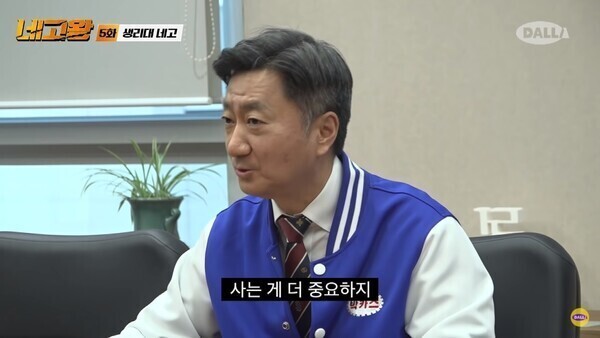“Would you like to go to the army?” “What if I am sexually harassed?” Questions
It is difficult to apply the Gender Equality Employment Act and the Employment Procedure Act
There is a possibility that the human rights violation’infringement of the right to equal rights’
Experts “The bill should be supplemented to sanction’sex discrimination interviews’”
“The Ministry of Employment and Labor is actively taking measures to provide guidance on municipal administration.”
 Carrying” alt=”Hojin Choi, President of Dong-A Pharmaceutical. Youtube <네고왕2> Save” />
Carrying” alt=”Hojin Choi, President of Dong-A Pharmaceutical. Youtube <네고왕2> Save” />
Ho-jin Choi, president of Dong-A Pharmaceutical. Save YouTube
After Dong-A Pharm’s gender discrimination interview became public, testimony was poured out on SNS that he also heard sexist remarks during the interview process.. Is there a way to punish or impose sanctions on companies that conducted a common sexist interview? Experts who responded to the interview on the 12th said that it seems difficult to punish sex discrimination in the interview process with the current law that prohibits discriminatory treatment in the hiring and hiring process. Despite the number of victims, the punishment for gender discrimination in interviews means that the legislative blank is in the state. Experts generally view that it is difficult to apply the current gender equal employment law, which prohibits discrimination based on gender in the employment process, to cases such as interviews with Dong-A Pharmaceutical. Article 7 (Recruitment and Recruitment) of the Gender Equal Employment Act stipulates that employers must not present or request conditions such as appearance, height, weight, etc. irrelevant to job performance when recruiting or hiring female workers. However, the relevant provisions of this law are usually interpreted as punishing gender discrimination on the terms of hiring in the employment announcement. Mi-young Koo, a researcher at the Korea Women’s Policy Institute, said, “Even if the current legal provisions are actively interpreted, it is not easy to prove employment discrimination only with discriminatory remarks in the interview process.” It is also difficult to apply the Recruitment Procedure Act, which governs the recruitment process, on the fairness of recruitment procedures. Article 4-3 of the Recruitment Procedure Act (prohibition of requesting personal information such as area of origin) is based on information such as △appearance, height, weight, etc., that the job seeker is not necessary for the job seeker’s job performance, △the country of origin, marital status, property, etc. It stipulates that it should not be requested. However, there are no rules prohibiting gender discriminatory remarks that may occur during the interview process. It is possible that Dong-A Pharmaceutical’s question on gender discrimination falls under the’discriminatory act of infringing equal rights’ as stipulated in the National Human Rights Commission Act. The Act considers “an act of preferential treatment, exclusion, discrimination or unfavorable treatment of a specific person in relation to employment (recruitment, recruitment, promotion, etc.)” as a discriminatory act of infringement of equal rights. Yoon Ji-young, attorney at the Public Interest Human Rights Law Foundation, said, “If you ask an unfavorable question on the grounds of gender without a reasonable reason, there is room for you to be considered unfavorable in terms of employment.” However, even if the NHRCK judges the gender discrimination interview as a discriminatory act and requests correction, there is a limit that it is limited to the recommended effect. As it was confirmed that there is no legal means to sanction sexually discriminatory questions during the interview process as a result of the Dong-A Pharmaceutical Incident, voices say that related laws should be strengthened to prevent the legislative gap. Attorney Ji-young Yoon said, “In the interview process, various human rights violations may occur against the interviewee, such as censorship of ideas as well as gender discrimination questions. He pointed out that there is a need to reinforce the recruitment process law, such as by introducing a new regulation that prohibits discriminatory questions or comments.” Even if the law is not revised, there is an opinion that it is possible to guide companies to correct discriminatory interview questions if the Ministry of Employment and Labor takes active measures. Research Fellow Koo said, “If a petition or anonymous report is filed with the Ministry of Employment and Labor about discriminatory remarks in an interview, it is already possible for the labor inspector to point out the problem and ask for efforts to prevent recurrence. Reports received at the Ministry of Labor’s Anonymous Reporting Center are being processed as such,” he said. By Lim Jae-woo, staff reporter [email protected]
